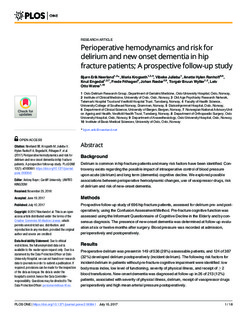| dc.contributor.author | Neerland, Bjørn Erik | |
| dc.contributor.author | Krogseth, Maria | |
| dc.contributor.author | Juliebø, Vibeke | |
| dc.contributor.author | Ranhoff, Anette Hylen | |
| dc.contributor.author | Engedal, Knut | |
| dc.contributor.author | Frihagen, Frede Jon | |
| dc.contributor.author | Ræder, Johan | |
| dc.contributor.author | Wyller, Torgeir Bruun | |
| dc.contributor.author | Watne, Leiv Otto | |
| dc.date.accessioned | 2018-02-22T14:50:19Z | |
| dc.date.available | 2018-02-22T14:50:19Z | |
| dc.date.created | 2017-07-18T11:12:23Z | |
| dc.date.issued | 2017 | |
| dc.identifier.citation | PLoS ONE. 2017, 12 (7:e0180641), 1-18. | nb_NO |
| dc.identifier.issn | 1932-6203 | |
| dc.identifier.uri | http://hdl.handle.net/11250/2486574 | |
| dc.description.abstract | Background: Delirium is common in hip fracture patients and many risk factors have been identified. Controversy exists regarding the possible impact of intraoperative control of blood pressure upon acute (delirium) and long term (dementia) cognitive decline. We explored possible associations between perioperative hemodynamic changes, use of vasopressor drugs, risk of delirium and risk of new-onset dementia.
Methods: Prospective follow-up study of 696 hip fracture patients, assessed for delirium pre- and postoperatively, using the Confusion Assessment Method. Pre-fracture cognitive function was assessed using the Informant Questionnaire of Cognitive Decline in the Elderly and by consensus diagnosis. The presence of new-onset dementia was determined at follow-up evaluation at six or twelve months after surgery. Blood pressure was recorded at admission, perioperatively and postoperatively.
Results: Preoperative delirium was present in 149 of 536 (28%) assessable patients, and 124 of 387 (32%) developed delirium postoperatively (incident delirium). The following risk factors for incident delirium in patients without pre-fracture cognitive impairment were identified: low body mass index, low level of functioning, severity of physical illness, and receipt of [more or the same] 2 blood transfusions. New-onset dementia was diagnosed at follow-up in 26 of 213 (12%) patients, associated with severity of physical illness, delirium, receipt of vasopressor drugs perioperatively and high mean arterial pressure postoperatively.
Conclusion: Risk factors for incident delirium seem to differ according to pre-fracture cognitive status. The use of vasopressors during surgery and/or postoperative hypertension is associated with new-onset dementia after hip fracture. | nb_NO |
| dc.language.iso | eng | nb_NO |
| dc.rights | Navngivelse 4.0 Internasjonal | * |
| dc.rights.uri | http://creativecommons.org/licenses/by/4.0/deed.no | * |
| dc.title | Perioperative hemodynamics and risk for delirium and new onset dementia in hip fracture patients; A prospective follow-up study | nb_NO |
| dc.type | Journal article | nb_NO |
| dc.type | Peer reviewed | nb_NO |
| dc.description.version | publishedVersion | nb_NO |
| dc.rights.holder | 2017 Neerland et al. | nb_NO |
| dc.source.pagenumber | 1-18 | nb_NO |
| dc.source.volume | 12 | nb_NO |
| dc.source.journal | PLoS ONE | nb_NO |
| dc.source.issue | 7:e0180641 | nb_NO |
| dc.identifier.doi | 10.1371/journal.pone.0180641 | |
| dc.identifier.cristin | 1482489 | |
| cristin.unitcode | 222,56,1,0 | |
| cristin.unitname | Institutt for sykepleie- og helsevitenskap | |
| cristin.ispublished | true | |
| cristin.fulltext | original | |
| cristin.qualitycode | 1 | |

